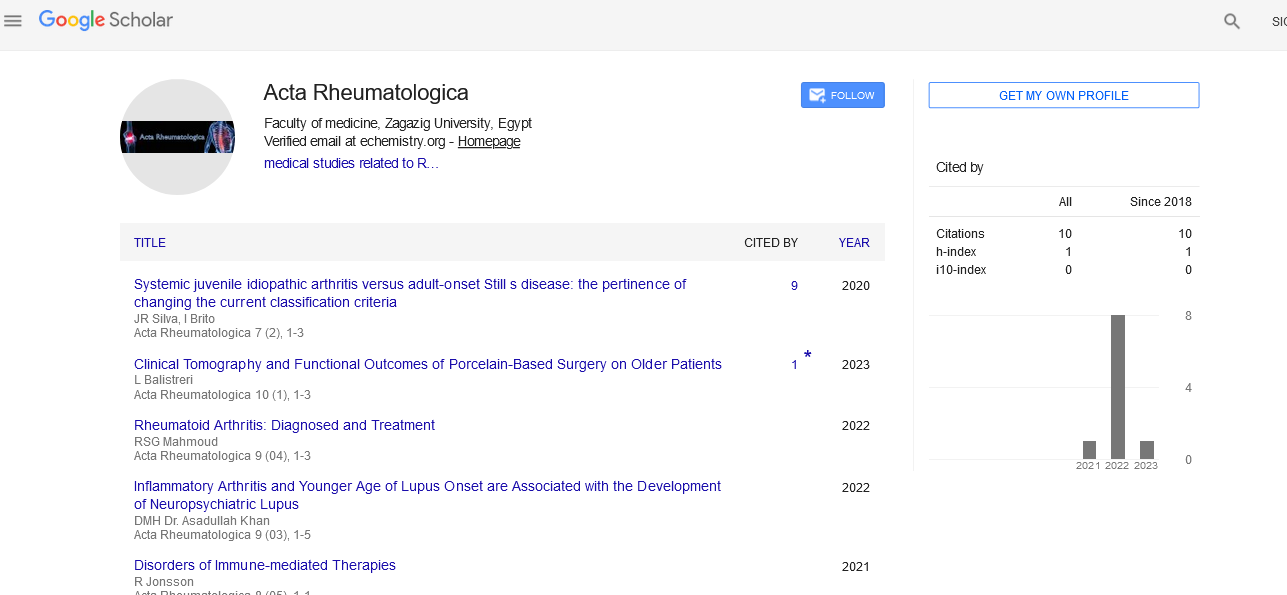Perspective - (2024) Volume 11, Issue 4
Unlocking the Potential of Biologics in Modern Medicine
Colin Guth*
Department of Medicine, McGill University, Montreal, Canada
*Correspondence:
Colin Guth, Department of Medicine, McGill University, Montreal,
Canada,
Email:
Received: 05-Jul-2024, Manuscript No. IPAR-24-15050;
Editor assigned: 08-Jul-2024, Pre QC No. IPAR-24-15050 (PQ);
Reviewed: 22-Jul-2024, QC No. IPAR-24-15050;
Revised: 31-Jul-2024, Manuscript No. IPAR-24-15050 (R);
Published:
08-Aug-2024
Introduction
In the ever-evolving landscape of medicine, biologics have
emerged as a transformative class of therapies, offering new
hope and treatment options for a myriad of diseases. Unlike
traditional chemical-based drugs, biologics are derived from
living organisms such as humans, animals, or microorganisms,
harnessing the power of biological processes to target specific
disease pathways with remarkable precision. This article
explores the unique characteristics, development process,
therapeutic applications, and future prospects of biologics in
modern healthcare.
Description
Understanding biologics
Biologics encompass a diverse array of therapeutic agents,
including monoclonal antibodies, vaccines, gene therapies, and
recombinant proteins. These complex molecules are designed to
mimic or augment natural biological processes within the body,
making them highly specific and effective in treating various
conditions ranging from cancer and autoimmune disorders to
infectious diseases.
Development and manufacturing
The development of biologics is a meticulous process that
begins with identifying a biological target or pathway implicated
in a disease. Researchers then use biotechnological techniques
to produce these molecules, often through genetic engineering
in living cells such as bacteria, yeast, or mammalian cells. This
process ensures the production of biologics that are both safe
and effective for clinical use.
Therapeutic applications
Biologics have revolutionized the treatment landscape across
several therapeutic areas:
Cancer therapy: Monoclonal antibodies like trastuzumab and
rituximab have significantly improved outcomes for cancer
patients by targeting specific proteins expressed on cancer cells.
Autoimmune diseases: Biologics such as adalimumab and
infliximab inhibit inflammatory pathways involved in autoimmune
diseases like rheumatoid arthritis and inflammatory bowel disease,
offering relief to patients with otherwise limited treatment
options.
Infectious diseases: Vaccines and antibody therapies have
played critical roles in preventing and treating infectious diseases
such as COVID-19, malaria, and hepatitis.
Genetic disorders: Gene therapies are at the forefront of
treating genetic disorders by delivering functional genes or
correcting defective ones, holding promise for conditions like
hemophilia and cystic fibrosis.
Advantages of biologics
The specificity of biologics offers several advantages over
traditional small molecule drugs:
Targeted therapy: Biologics can precisely target diseasecausing
molecules, minimizing off-target effects and enhancing
therapeutic efficacy.
Personalized medicine: Advances in biologics enable tailored
treatments based on individual genetic profiles and disease
characteristics.
Long-lasting effects: Some biologics, such as gene therapies,
offer the potential for long-term or even curative effects by
addressing the underlying cause of disease.
Safety profile: Biologics are generally well-tolerated due to
their biological origin, reducing the risk of adverse reactions
compared to chemical-based drugs.
Challenges and considerations
Despite their promise, biologics pose unique challenges:
Cost: Biologic therapies can be expensive to develop and
manufacture, contributing to high treatment costs and limited
accessibility for some patients.
Immunogenicity: The immune system may recognize biologics
as foreign substances, leading to immune responses that can
affect treatment efficacy and safety.
Complex manufacturing: The production of biologics requires
specialized facilities and expertise, adding to the complexity and
cost of manufacturing.
Future directions
The future of biologics holds exciting possibilities:
Advanced therapies: Continued research into novel biologic
platforms such as RNA-based therapies and cellular
immunotherapies is expected to expand treatment options and
improve outcomes across various diseases.
Biosimilars: The development of biosimilars biologic drugs that
are highly similar to existing biologics promises to enhance
affordability and accessibility, driving competition in the biologics
market.
Personalized approaches: Advances in genomics and
biotechnology will enable more personalized biologic therapies
tailored to individual patient profiles, optimizing treatment
efficacy and minimizing side effects.
Conclusion
Biologics represent a paradigm shift in modern medicine,
offering targeted therapies with unparalleled precision and
efficacy across a wide spectrum of diseases. While challenges
such as cost and manufacturing complexity remain, ongoing
research and technological advancements promise to unlock
new frontiers in biologic innovation. As we continue to harness
the power of biologics, the future holds immense potential for
transforming healthcare and improving the lives of patients
worldwide.
Citation: Guth C (2024) Unlocking the Potential of Biologics in Modern Medicine. Acta Rheuma Vol:11 No:4





